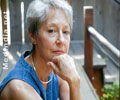Women in their late thirties and forties who have trouble sleeping are more than three times more likely to suffer sleep problems during menopause than women who have an easier time getting shut-eye.

Only 25 percent of women who had reported no earlier sleep problems developed moderate or severe insomnia or other sleep disturbances during a 16-year period around menopause. What's more, the researchers say that these sleep woes did not appear to be caused by menopause itself, which may quell common fears about symptoms associated with this phase of life. The study is among the first to document long-term sleep patterns in women in the years before, during and after menopause.
Lead author, Ellen W. Freeman, said that a small subgroup of women with only mild sleep disturbance prior to menopause also experienced worsening sleep disturbance during the transition, but their results show that for the majority of women, menopause does not further exacerbate existing sleep problems or cause new ones.
The study assessed annually the sleep patterns of 255 women participating in the Penn Ovarian Aging Study who reached natural menopause during a 16-year period (1996-2012). At enrollment, all women were aged 35 to 48 years and premenopausal, with 28 percent reporting moderate-to-severe sleep disturbances, which is similar to the prevalence of insomnia symptoms among adults, and 56 percent reporting no sleep disturbances at all. Over the 16 year period, 82 percent of the sample experienced moderate-to-severe issues with sleep, while only 7 percent had no poor sleep.
The study also found that hot flashes are strongly associated with poor sleep as expected, but a large proportion of poor sleep in menopausal women occurred without hot flashes. The finding, Freeman says, indicates that sleep difficulties in the transition to menopause in generally healthy women should not automatically be imputed to ovarian decline.
Freeman added that clinicians should be alert to the strong possibility that poor sleep in women approaching menopause is not simply caused by menopause or hot flashes.
Advertisement
The study is published in the journal Menopause.
Advertisement















